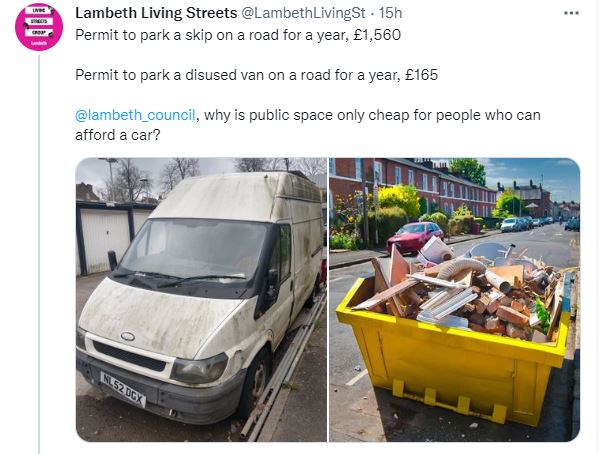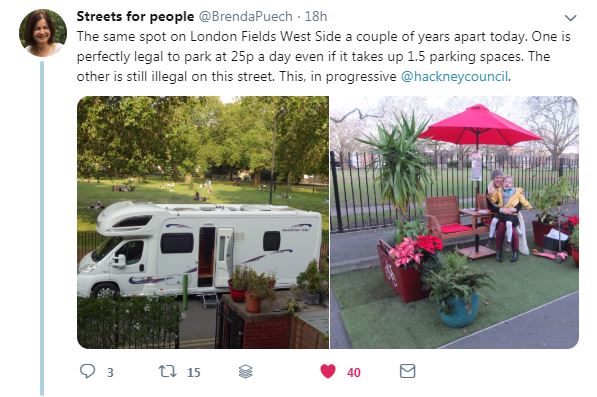
As a driver, it’s easy to feel entitled to the road space outside one’s home, but what value should be placed upon it?
The pressure on parking space is most acute in cities, despite these areas housing the highest proportion of people without access to a car. In common with other boroughs in London, Islington is blighted by dangerous air pollution from traffic. In response, the council charges residents to park based on the emissions of their car. For example, it costs nothing to park an electric car, £104 for a the permit to park a Range Rover Evoque eD4 (130g/km CO2) and over £500 per year to park the biggest gas guzzlers.
However, the council charges an annual fee of £107 (plus £25 as a key deposit) to park a bicycle in one of it’s on street bike hangers – more than it costs to park a Range Rover. We understand that the bike hangers cost money to buy, install and maintain, but why not use the funds generated by those who insist on parking the most polluting vehicles?

The double standards applied to heavily subsidised parking spots isn’t lost of those who campaign for parklets.

1970s San Francisco was the birthplace of the parklet – a way of reclaiming a single car parking space in favour of public space. The first one-day parklet was created in 2005 when a group fed a parking meter with coins, rolled out a length of turf and installed a potted tree.
When we designed our own parklet on behalf of Kingston council, we bypassed the need for a parking permits by making it mobile. It was towed into place using an electric cargo trike and then removed at the end of each day.
What value should be placed on a parking space?
Road space is public space. There’s an assumption that drivers should always have access to parking but in the cities of some countries you can’t register a car before proving you have somewhere to keep it. When road space is allocated to parking, it makes sense that it’s charged at a realistic rate.
Barnet council lost an appeal brought by disgruntled residents who objected to the cost of their annual parking permits being increased to £100. However, the plaintiffs should be thankful parking space is not charged on the basis of its land value.
If that were the case, Barnet might feasibly multiply the average cost per square metre of housing by the area occupied by the average car (£6,668 x 11.52m2). This puts the value of a car parking space at over £75,000 – a sum which makes the £100 per annum permit to occupy it seem not only cheap, but over subsidised.
Whatever, metric is used to calculate parking charges, in our congested and polluted cities, it should never be the case that a Range Rover is cheaper to park than a bicycle.
The ethical choice
The ETA was established in 1990 as an ethical provider of green, reliable travel services. Over 30 years on, we continue to offer cycle insurance , breakdown cover and mobility scooter insurance while putting concern for the environment at the heart of all we do.
The Good Shopping Guide judges us to be the UK’s most ethical provider.
JILL Granger
Mysteries. I do not cycle but both my grandchren and my son and daughter.I hwve a mobikity scooter insured with you,Great value.
JILL GRANGER
All my family cycle zs did I until I got ancient now have a mobility scooter insured with you great value.
Chris
Interesting article showing how we subsidise drivers, even when they are leaving their vehicles parked. However, it’s blighted by poor grammar – e.g. “the council charges an annual fee of £107 (plus £25 as a key deposit) to park a bicycle in one of it’s on street bike hangers” – “it’s” does not mean “belonging to it” it’s short for “it is”.
Also “Whatever, metric is used to calculate parking charges” doesn’t make sense. The first comma should not be there. Very poor journalism.